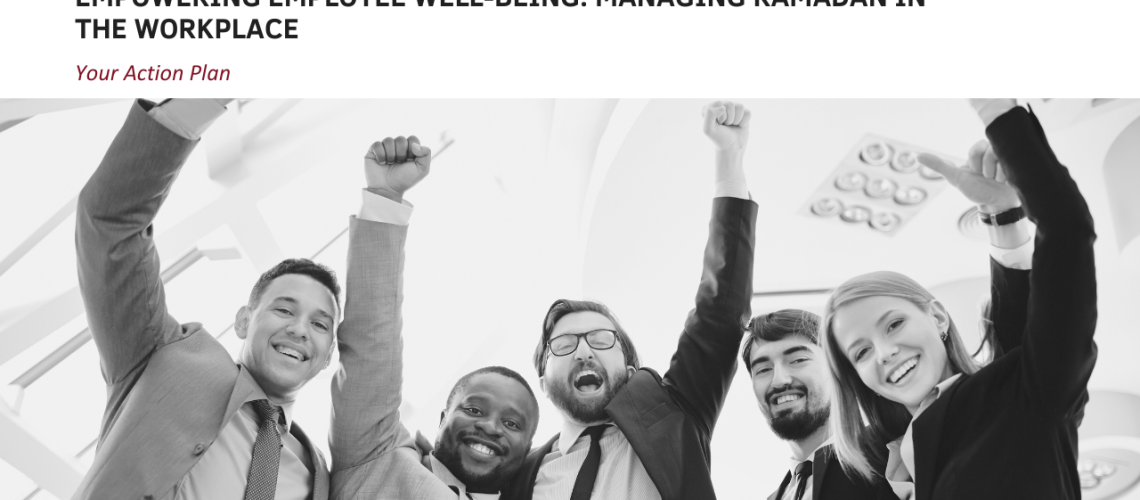By Dr. Salam Slim Saad
Fostering inclusivity and understanding among diverse employee populations stands as a cornerstone of organizational success. As we enter the holy month of Ramadan, marked by spiritual reflection and fasting for millions worldwide, businesses are presented with a unique opportunity to support cultural diversity and support their employees. Through thoughtful initiatives and a commitment to empathy, companies can create environments where every individual feels valued and respected, thus cultivating a workplace culture that thrives on inclusivity and compassion. Ramadan in the workplace proves the transformative impact of extending support and solidarity to our colleagues during this holy month.
Understanding the Challenges Employees Faced during Ramadan
Ramadan presents unique challenges for employees in the workplace. Beyond its religious significance, Ramadan introduces a host of considerations that can impact daily work routines and interactions:
- Managing Energy Levels: Fasting involves abstaining from food and drink during daylight hours, leading to fatigue and reduced focus, impacting work performance.
- Dealing with Long Hours and Physical Tasks: Extended work hours or demanding tasks become more challenging during fasting due to decreased energy levels, affecting productivity.
- Balancing Work and Religious Commitments: Attending prayer sessions throughout the day may require adjustments to work schedules or breaks, necessitating employer flexibility.
- Navigating Social Activities: Events centered around food and drinks can be uncomfortable for fasting employees, hindering full participation and potentially causing isolation.

Employers should take proactive steps to support employees during Ramadan:
- Implement Wellness Initiatives: Tailored programs for Ramadan can promote employee well-being while respecting religious practices.
- Offer Flexibility: Adjusting work schedules or providing alternative options for social gatherings can accommodate fasting employees’ needs.
Recognizing and addressing these challenges fosters a supportive workplace environment, promoting inclusivity and respect for all employees during this sacred month.
Benefits of Implementing Wellness Initiatives during Ramadan in the Workplace
Implementing tailored wellness initiatives during this sacred month not only demonstrates a commitment to fostering an inclusive work environment but also yields a myriad of benefits for both employees and employers alike. From boosting morale to enhancing productivity and promoting mental well-being, these initiatives serve as a testament to an organization’s empathy and compassion towards its workforce.

- Promotes Inclusivity and Diversity: Wellness initiatives during Ramadan showcase a commitment to creating an inclusive work environment where every employee feels valued and respected, fostering a sense of belonging.
- Boosts Morale and Satisfaction: By demonstrating care for the well-being of Muslim employees, organizations can increase morale, job satisfaction, and loyalty across the workforce.
- Enhances Productivity: Flexible working hours and adjusted workload expectations during Ramadan support Muslim employees in managing their energy levels effectively, leading to sustained productivity levels.
- Alleviates Stress and Promotes Mental Well-being: Wellness programs such as mindfulness sessions and yoga classes tailored for Ramadan offer employees opportunities for relaxation and self-care, contributing to overall mental well-being for all staff members.
- Demonstrates Empathy and Compassion: By recognizing the challenges faced by Muslim employees during Ramadan and providing support measures like designated prayer spaces and nutritious iftar meals, employers showcase empathy and compassion, reinforcing their commitment to employee welfare beyond job-related concerns.
Wellness Programs for Ramadan in the Workplace
Wellness programs during Ramadan can vary depending on the needs and preferences of employees, as well as the resources available to employers. Here are a few examples of wellness that have been implemented in workplaces during this holy month:

- Flexible Working Hours: Employers can allow for flexible working hours during Ramadan, allowing Muslim employees to adjust their schedules according to their fasting routines. This can help them manage their energy levels more effectively and maintain productivity throughout the day.
- Quiet Spaces for Prayer: Designating quiet spaces in the workplace where employees can pray or engage in moments of reflection is an essential component of supporting Muslim employees during Ramadan. These dedicated spaces ensure that individuals have a comfortable environment where they feel respected and supported.
- Foster Understanding and Awareness: Promote cultural sensitivity by educating all employees about the significance of Ramadan and its impact on Muslims’ lives. Encourage open dialogue and provide resources such as workshops or training sessions to increase understanding among colleagues.
- Healthy Iftar Options: Offering healthy iftar options in company cafeterias or arranging for catered meals promotes nutritious eating habits among employees who break their fast at work. It demonstrates thoughtfulness towards Muslim colleagues’ dietary requirements and encourages everyone to embrace healthier choices.
- Adjust Workloads: Recognize that fasting may temporarily affect productivity levels due to changes in energy levels and focus. Adjusting workloads or deadlines accordingly can help alleviate stress on Muslim employees during this period.
- Supportive Workplace Culture: Creating a supportive workplace culture involves fostering inclusivity year-round but especially during Ramadan. Encourage team members to engage in acts of kindness, empathy, and patience towards one another throughout the month-long observance.
- Volunteer Opportunities: Encouraging team members to participate in charitable activities such as volunteering at local food banks or organizing donation drives aligns with the spirit of giving during Ramadan. Engaging in these initiatives helps foster employee well-being by creating stronger bonds between colleagues while making a positive impact on society.
Tips for Non-Fasting Employees to Show Support and Respect during Ramadan
it’s essential for non-fasting employees to demonstrate support and respect for their Muslim colleagues’ religious observances, they can play a crucial role in creating a supportive and inclusive environment during this sacred time.
- Educate Yourself: Take the time to learn about the significance of Ramadan and familiarize yourself with its customs and traditions. This will help you understand what your colleagues may be experiencing during this holy month.
- Be Mindful of Eating Habits: During Ramadan, Muslims fast from sunrise to sunset, which means they abstain from food and drink. If you have lunch or coffee breaks together, try not to eat or drink in front of them out of respect.
- Avoid Scheduling Meetings around Iftar time: I It’s considerate to avoid scheduling important meetings or team gatherings during times when your coworkers may need to break their fasts for Iftar (the evening meal to break the fast). Additionally, be mindful of time differences if working with colleagues in different time zones, ensuring meetings are scheduled at times that are convenient for all, especially during Ramadan when fasting hours may vary based on geographical location.
- Offer Flexibility: Consider providing more flexible work arrangements if possible, such as adjusting working hours or allowing remote work options during Ramadan. This can help accommodate the potential fatigue that fasting employees might experience.
- Extend Invitations: If you’re organizing social events at work, make sure to include all employees, including those observing Ramadan. However, be sensitive by offering non-food-related activities so everyone can participate comfortably.
- Cultivate an Inclusive Environment: Foster a culture of inclusivity where diversity is celebrated year-round – not just during religious holidays like Ramadan.
As we conclude this discussion, it’s essential to recognize that empowering employee well-being during Ramadan is a collective effort that requires ongoing commitment and communication within the workplace. Encouraging open dialogue and soliciting feedback from employees can further enhance the effectiveness of support initiatives.
We invite you to continue exploring ways to empower employee well-being in your own workplace, not only during Ramadan but throughout the year. By prioritizing inclusivity and fostering a supportive environment, we can create workplaces where all employees feel valued.


